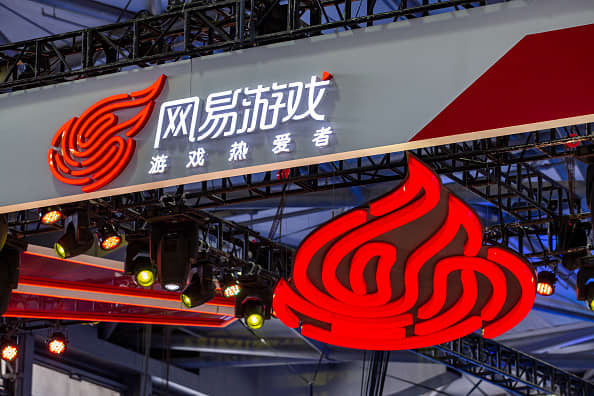NetEase Games logo is seen above the company’s booth one day before the 2019 China Digital Entertainment Expo & Conference (ChinaJoy) at Shanghai New International Expo Center on August 1, 2019 in Shanghai, China.
VCG | Getty Images
There’s a “healthy” pipeline of Chinese companies listing in Hong Kong, and one key trend ahead will be more tech firms that will do so increasingly, business and government leaders in the city said Wednesday.
U.S.-listed Chinese gaming giant Netease launched its secondary listing in Hong Kong last week, raising $21.09 billion Hong Kong dollars ($2.7 billion). Chinese e-commerce firm JD.com also launched a secondary listing and is set to start trading in Hong Kong Thursday.
That followed the mega secondary listing of Alibaba last November in the city.
“Netease just finished last week, and we have JD.com, we have a very healthy pipeline. In fact, it took me a little bit (by) surprise that all these IPOs despite all the challenges are coming here … They are returning home … many of the customers here want to be their shareholders,” Charles Li, chief executive officer of Hong Kong Exchanges and Clearing, told CNBC on Wednesday.
“If you look at Netease, even though it’s just listed for a few days, the center of gravity of trading seems to be migrating very healthily into Hong Kong,” he added.
One of the key trends we have seen in Hong Kong in so far as our securities market is concerned, is that there’s increasing number of new economy companies coming to list here.
Christopher Hui
Hong Kong’s secretary for financial services and the treasury
Analysts have predicted that more U.S.-listed Chinese companies will flock back to Hong Kong as Sino-U.S. tensions rise.
The U.S. Senate passed a bill last month which could essentially ban many Chinese companies from listing on American exchanges.
At the same time, Hong Kong has been making it more attractive for such companies to list in the Asian financial hub. Last month, the 50-year-old Hang Seng index announced that it will for the first time allow companies with primary listings overseas to be included in the benchmark index.
Christopher Hui, Hong Kong’s secretary for financial services and the treasury, told CNBC on Wednesday: “One of the key trends we have seen in Hong Kong in so far as our securities market is concerned, is that there’s increasing number of new economy companies coming to list here,” Hui said.
“We have very strong financial regulations, at the same time we are seeing many companies would like to come back to Hong Kong to list for our proximity to China, yet at the same time being able to tap into the huge capital pool here in Hong Kong, with the international investors here,” he added.
That will be positive for shares of Hong Kong Exchange and Clearing, according to analysts at Citi Research in a note last week, who reiterated a “buy” call on the stock.
“HK Exchange and Clearing looks well positioned to capture homecoming listings by US-listed China firms,” they wrote.
They said that there had already been a “visible trend” of fewer Chinese firms listing in the U.S. after 2015. Reasons for that include U.S. investors who are unfamiliar with Chinese firms, as well as perceived benefits of listing in Asia.
“This trend could become a relisting wave as US-China trade and political tensions have escalated,” they wrote.
Tensions between Beijing and Washington have ramped up in recent months over a multitude of issues, from the origins of the coronavirus, to China’s move to approve a national security law in Hong Kong. The latter prompted President Donald Trump to announce that Hong Kong’s preferential trading status with the U.S. will be revoked.
